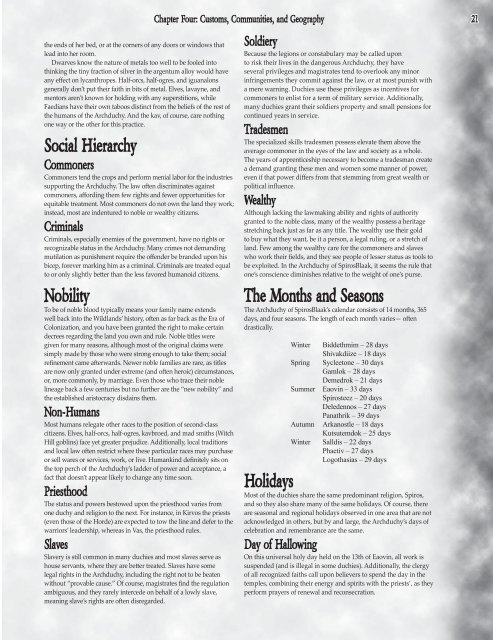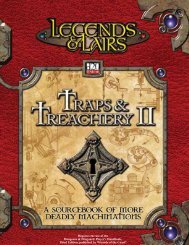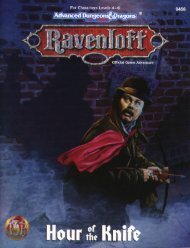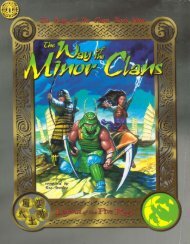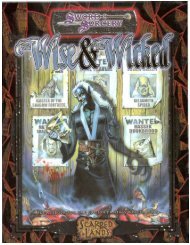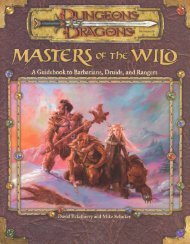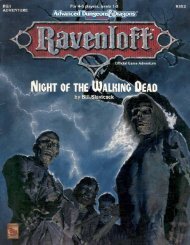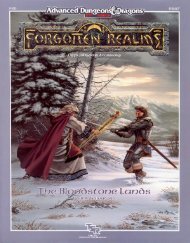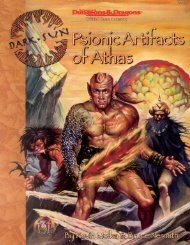Mythic Vistas: SpirosBlaak - Property Is Theft!
Mythic Vistas: SpirosBlaak - Property Is Theft!
Mythic Vistas: SpirosBlaak - Property Is Theft!
You also want an ePaper? Increase the reach of your titles
YUMPU automatically turns print PDFs into web optimized ePapers that Google loves.
the ends of her bed, or at the corners of any doors or windows that<br />
lead into her room.<br />
Dwarves know the nature of metals too well to be fooled into<br />
thinking the tiny fraction of silver in the argentum alloy would have<br />
any effect on lycanthropes. Half-orcs, half-ogres, and iguanalons<br />
generally don’t put their faith in bits of metal. Elves, lavayne, and<br />
mentors aren’t known for holding with any superstitions, while<br />
Faedians have their own taboos distinct from the beliefs of the rest of<br />
the humans of the Archduchy. And the kav, of course, care nothing<br />
one way or the other for this practice.<br />
Social Hierarchy<br />
Commoners<br />
Commoners tend the crops and perform menial labor for the industries<br />
supporting the Archduchy. The law oen discriminates against<br />
commoners, affording them few rights and fewer opportunities for<br />
equitable treatment. Most commoners do not own the land they work;<br />
instead, most are indentured to noble or wealthy citizens.<br />
Criminals<br />
Criminals, especially enemies of the government, have no rights or<br />
recognizable status in the Archduchy. Many crimes not demanding<br />
mutilation as punishment require the offender be branded upon his<br />
bicep, forever marking him as a criminal. Criminals are treated equal<br />
to or only slightly beer than the less favored humanoid citizens.<br />
Nobility<br />
To be of noble blood typically means your family name extends<br />
well back into the Wildlands’ history, oen as far back as the Era of<br />
Colonization, and you have been granted the right to make certain<br />
decrees regarding the land you own and rule. Noble titles were<br />
given for many reasons, although most of the original claims were<br />
simply made by those who were strong enough to take them; social<br />
refinement came aerwards. Newer noble families are rare, as titles<br />
are now only granted under extreme (and oen heroic) circumstances,<br />
or, more commonly, by marriage. Even those who trace their noble<br />
lineage back a few centuries but no further are the “new nobility” and<br />
the established aristocracy disdains them.<br />
Non-Humans<br />
Most humans relegate other races to the position of second-class<br />
citizens. Elves, half-orcs, half-ogres, kavbroed, and mad smiths (Witch<br />
Hill goblins) face yet greater prejudice. Additionally, local traditions<br />
and local law oen restrict where these particular races may purchase<br />
or sell wares or services, work, or live. Humankind definitely sits on<br />
the top perch of the Archduchy’s ladder of power and acceptance, a<br />
fact that doesn’t appear likely to change any time soon.<br />
Priesthood<br />
The status and powers bestowed upon the priesthood varies from<br />
one duchy and religion to the next. For instance, in Kirvos the priests<br />
(even those of the Horde) are expected to tow the line and defer to the<br />
warriors’ leadership, whereas in Vas, the priesthood rules.<br />
Slaves<br />
Slavery is still common in many duchies and most slaves serve as<br />
house servants, where they are beer treated. Slaves have some<br />
legal rights in the Archduchy, including the right not to be beaten<br />
without “provable cause.” Of course, magistrates find the regulation<br />
ambiguous, and they rarely intercede on behalf of a lowly slave,<br />
meaning slave’s rights are oen disregarded.<br />
Chapter Four: Customs, Communities, and Geography 21<br />
Soldiery<br />
Because the legions or constabulary may be called upon<br />
to risk their lives in the dangerous Archduchy, they have<br />
several privileges and magistrates tend to overlook any minor<br />
infringements they commit against the law, or at most punish with<br />
a mere warning. Duchies use these privileges as incentives for<br />
commoners to enlist for a term of military service. Additionally,<br />
many duchies grant their soldiers property and small pensions for<br />
continued years in service.<br />
Tradesmen<br />
The specialized skills tradesmen possess elevate them above the<br />
average commoner in the eyes of the law and society as a whole.<br />
The years of apprenticeship necessary to become a tradesman create<br />
a demand granting these men and women some manner of power,<br />
even if that power differs from that stemming from great wealth or<br />
political influence.<br />
Wealthy<br />
Although lacking the lawmaking ability and rights of authority<br />
granted to the noble class, many of the wealthy possess a heritage<br />
stretching back just as far as any title. The wealthy use their gold<br />
to buy what they want, be it a person, a legal ruling, or a stretch of<br />
land. Few among the wealthy care for the commoners and slaves<br />
who work their fields, and they see people of lesser status as tools to<br />
be exploited. In the Archduchy of <strong>SpirosBlaak</strong>, it seems the rule that<br />
one’s conscience diminishes relative to the weight of one’s purse.<br />
The Months and Seasons<br />
The Archduchy of <strong>SpirosBlaak</strong>’s calendar consists of 14 months, 365<br />
days, and four seasons. The length of each month varies— oen<br />
drastically.<br />
Winter Biddethmim – 28 days<br />
Shivakdiize – 18 days<br />
Spring Sycleetone – 30 days<br />
Gamlok – 28 days<br />
Demedrok – 21 days<br />
Summer Eaovin – 33 days<br />
Spirosteez – 20 days<br />
Deledennos – 27 days<br />
Panathrik – 39 days<br />
Autumn Arkanostle – 18 days<br />
Kutsutemdok – 25 days<br />
Winter Salldis – 22 days<br />
Phaetiv – 27 days<br />
Logothasias – 29 days<br />
Holidays<br />
Most of the duchies share the same predominant religion, Spiros,<br />
and so they also share many of the same holidays. Of course, there<br />
are seasonal and regional holidays observed in one area that are not<br />
acknowledged in others, but by and large, the Archduchy’s days of<br />
celebration and remembrance are the same.<br />
Day of Hallowing<br />
On this universal holy day held on the 13th of Eaovin, all work is<br />
suspended (and is illegal in some duchies). Additionally, the clergy<br />
of all recognized faiths call upon believers to spend the day in the<br />
temples, combining their energy and spirits with the priests’, as they<br />
perform prayers of renewal and reconsecration.


